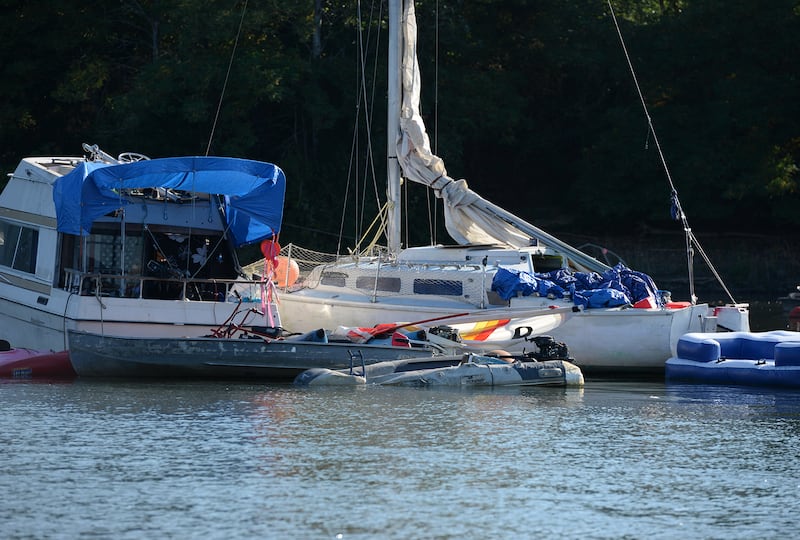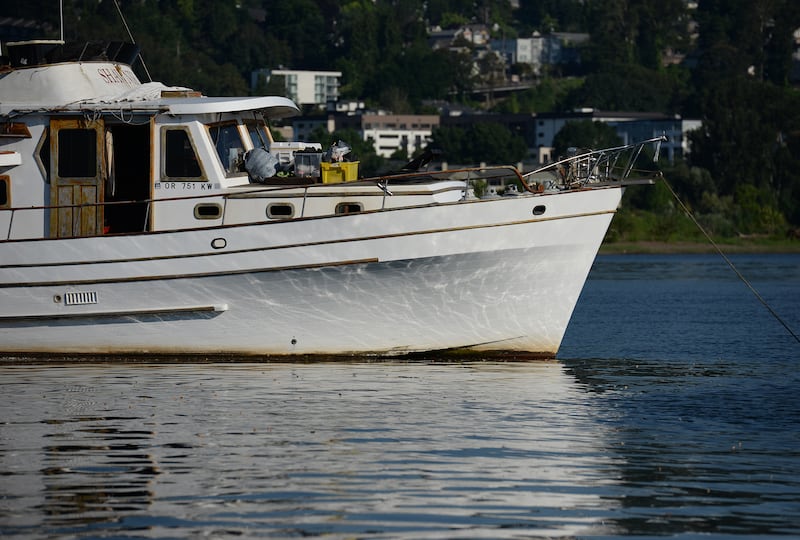Under a broiling late July sun, eight-member crew shells skim across the top of the bottle-green Willamette River like water bugs. Standup paddleboarders glide more slowly on the glassy water.
And at the south end of heavily forested Ross Island, a motley flotilla of a dozen and a half cast-off boats moves not at all.
They are cabin cruisers, demasted sailboats, and smaller craft that once towed skiers or carried sport fishermen. Most are temporary homes. Others look like garbage barges, their accumulations of furniture, clothing, bicycles and piles of trash overflowing into the water.
Eric Pedersen, who grew up in Southeast Portland, took a reporter out on the river last week on his 24-foot Alumaweld boat to show the accumulation of vessels, most unlicensed and moored illegally.
“There’s no garbage pickup out here, no place to pump out your wastewater,” Pedersen says of the boats. “If you unhooked your sewage from the city system at home, how would that work?”
People who live, work or play on local rivers agree there’s a crisis on Oregon’s waters: the large and growing number of abandoned and derelict boats moored in rivers and estuaries all over the state. The vessels often sink in navigable waters, imperiling other boats and threatening to leak fuel and other toxic substances into the drink. State officials say there are at least 175 of them in the metro area, far more than a decade ago—or ever.
The epicenter of the junk boats is Ross Island, the teardrop-shaped spit of uplands on the Willamette, just upstream from the bridge that shares its name. Officials say the inlet at the south end of the island called Toe Island Cove hosts the greatest concentration of occupied and derelict vessels in Portland.
“Last time I went out on the water, I couldn’t believe how many boats are out there,” says Travis Williams of the conservation group Willamette Riverkeeper.
The causes are many: a shortage of housing on land that’s led people to consider aquatic alternatives; an aging fleet of fiberglass boats that cannot be recycled and are expensive to scrap; and a shortage of public funding for enforcement and disposal of derelict boats.
But at Ross Island, there’s an additional wrinkle: Unlike virtually all of the Willamette River (and other navigable Oregon rivers), the river bottom where the abandoned and derelict boats congregate is privately owned.
The Multnomah County sheriff’s River Patrol can tag and tow vessels that are illegally moored in state waters, using funding provided by the Oregon State Marine Board. But its jurisdiction doesn’t extend to private lands—and the secret is out.
“Boaters have learned over the years where they can and cannot be removed or be forced to leave,” says Sgt. Steve Dangler, who heads the River Patrol. “They know that if they are pretty close to shore of Ross Island that Department of State Lands rules don’t apply.”

From 1975 until this year, the river bottom around much of the island belonged to Ross Island Sand & Gravel, a subsidiary of R.B. Pamplin Corp. The company mined the lagoon in the interior of Ross Island down to a depth of 130 feet and processed rock on the adjacent Hardtack Island. Mining ceased in 2001 and the company is now under state order to refill the hole and restore habitat on both islands, a process it expects to complete by 2035.
The president and CEO of R.B. Pamplin Corp., Robert Pamplin Jr., also owns the Portland Tribune and 23 other Oregon newspapers.
Documents WW obtained under a public records request show that officials from the Department of State Lands, the Multnomah County Sheriff’s Office and the Oregon State Marine Board have repeatedly met with Ross Island officials about the issue of abandoned and derelict vessels.
Dangler of the River Patrol spends most days on the water keeping an eye out for swimmers and boaters in distress or behaving badly. He also tries to enforce the state law that says a boat can moor in one spot for no more than 30 days, then must move at least 5 miles away.
On a recent day, Dangler says, he tagged seven abandoned or derelict boats at Toe Island, a city-owned spit of land west of Ross Island. Those boats can be towed and, if nobody claims them, scrapped. But just yards away, the biggest concentration of such boats in the metro area is beyond his jurisdiction.
“We enforce the boating rules and regulations and laws, but we cannot enforce the trespassing piece around Ross Island,” Dangler says. “So the loophole does exist.”
Pamplin spokesman Mark Garber says private ownership of the river bottom around Ross Island predates statehood, but the company has tried its best to cooperate with official attempts to deal with unwanted boats. Garber says such boats began turning up around 2009.
Company officials regularly provide the sheriff’s office photos and information about boats that are illegally moored; have given the sheriff written permission to remove the boats; and are active participants in a task force aimed at solving the problem. “Ross Island has been working early and often to remedy the blight brought upon its property and the river,” Garber says.
But, Garber adds, the Multnomah County district attorney says criminal trespass cases are unlikely to hold up in court. And the sheriff’s office says seizing boats would require an unaffordable inventory and storage of vessels with no hope of cost recovery.
Under advice of legal counsel, the company will generally not intervene or tow boats itself.
“Ross Island Sand & Gravel said their maritime attorney advised against towing because then RISG would own and become responsible for the boat and all its contents,” read Department of State Lands director Vicki Walker’s notes from an Oct 18, 2018, meeting.
In 2020, RISG did get permission from the marine board to remove two vessels that burned in Toe Island Cove. It cost the company $16,000 to get rid of them.
“Ross Island has been unable to recoup a dime from the vessel owners,” Garber says.
The imbroglio continues. In fact, due to an unusual decision by Robert Pamplin Jr., the situation is even more complicated.
As WW previously reported, Pamplin transferred ownership of Ross and Hardtack islands and their submerged lands earlier this year to the R.B. Pamplin Corp. pension fund, of which Pamplin is the sole trustee, at a valuation of $10.8 million. (Pension experts have been critical of Pamplin’s sale or transfer of about $50 million worth of R.B. Pamplin Corp. real estate to the company’s pension fund.)
The upshot of the transfer is that the watery parking lot for decrepit boats adjacent to Ross Island now belongs to 2,400 Pamplin pensioners. (Garber says Ross Island Sand & Gravel leases the island back from the pension fund.)
Willamette Riverkeeper’s Williams, who has worked for decades for the return of Ross Island to public ownership, says the financial machinations are happening amid the degradation of delicate habitat.
“If you look at the area where boats have congregated, you won’t believe how much junk has collected on Ross Island,” he says. “The whole thing just doesn’t make sense.”

The issue of abandoned and derelict boats is a growing threat to navigation and marine environments here and across the country.
Ron Schmidt, president of Waterfront Organizations of Oregon, which represents marinas and other waterfront businesses, has pressed state lawmakers to take the issue seriously.
“It’s definitely gotten worse,” Schmidt says. “In addition to the houseless issue, we’ve got a generation of fiberglass boats that are at the end of their lives. Owners are selling those boats cheaply to people who may not have the knowledge or the funds to maintain them.”
Like the ancient RVs that have become homes of last resort as owners seek to avoid the expense of disposing of them, old fiberglass boats are available cheap—or free.
Over the past two years, the marine board paid for the removal of 44 boats, 38 of them in Multnomah County. But that agency’s removal budget is currently capped at $150,000. Three bills that would have increased the funding available for the purpose of more removal failed in the 2021 legislative session.
But state Sen. Kathleen Taylor (D-Southeast Portland), whose district borders the Willamette River near Ross Island, wrangled a one-time appropriation of $1 million to remove more vessels.
That’s a start but nowhere near enough to tackle the failing boats in the metro area and untold more in rivers and estuaries around the state. (Metro also got $2.7 million from lawmakers to remove boats on the Columbia River.)
On Aug. 9, DSL’s Walker will lay out a work plan for the three members of the State Land Board—Gov. Kate Brown, State Treasurer Tobias Read and Secretary of State Shemia Fagan—explaining how her agency would deploy $40 million it will seek from lawmakers to tackle the problem in earnest over the next three years.
“Abandoned and derelict vessels seriously threaten the health and safety of Oregon’s waterways,” Walker’s memo to the land board says. “Threats include water contamination, habitat degradation, public and private property damage, and impacts on recreational and commercial use and enjoyment of waterways.”
Kelly Holtz moved in 2011 to a houseboat row near Oaks Park, just upstream from Ross Island. She says she was drawn to the ever-changing beauty of the Willamette and the wildlife that uses Ross Island as a refuge.
Now, when Holtz looks downstream, she sees a lot of illegally moored boats not served by garbage removal or even a portable toilet. Supply boats buzz out from the dock at nearby Willamette Park to what has become an unpermitted community.
“There are so many more of them than when I moved in,” Holtz says.
Bob Sallinger, conservation director of the Audubon Society of Portland, has worked for more than two decades with Riverkeeper’s Williams and Mike Houck of the Urban Greenspaces Institute to convince Pamplin to convert Ross Island to public ownership.
Pamplin did donate 45 acres of the island to the city of Portland in 2007, but talks have broken down since then—and will only become more complicated now that the pension fund owns the island.
“Dr. Pamplin is very proud of that island,” Sallinger says. “It would be a sad thing if he doesn’t move this to resolution.”
Eric Pedersen shares Sallinger’s hope that the waters around Ross Island will be restored. He swam or water-skied most summer days as a teenager 30 years ago but wouldn’t swim near the island now.
As Pedersen nosed his boat onto the boat ramp at Willamette Park on July 29, he eyed the occupants of a dilapidated sailboat pulling away from the dock, where they’d left box of trash: “At least they didn’t throw it in the water.”

